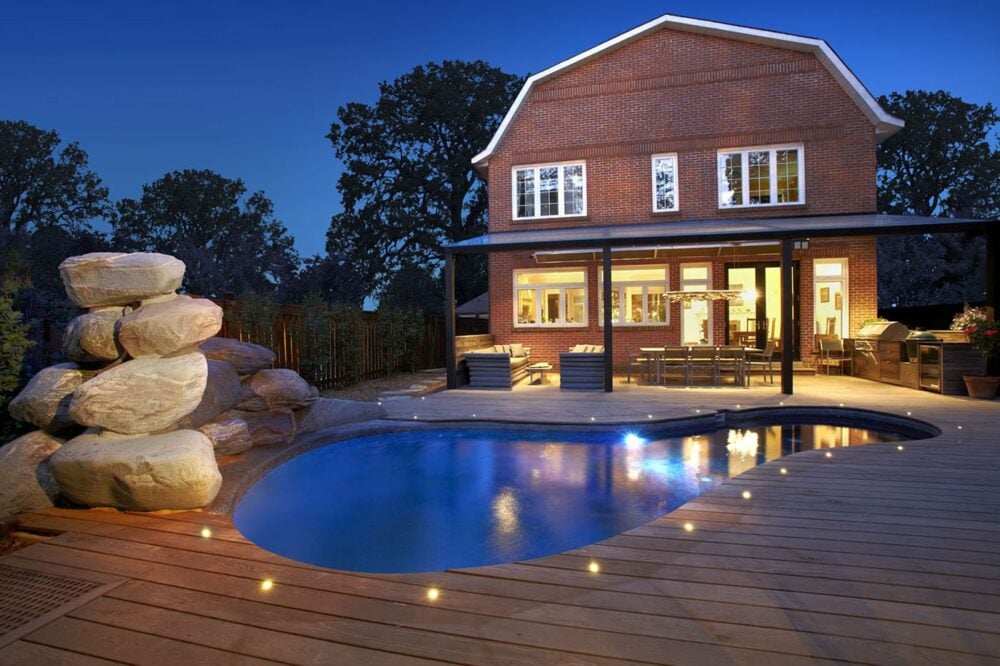
There is nothing quite like the right kind of lighting to enhance the natural beauty of classic wood decks. Deck lighting not only improves safety but also creates a more relaxing and inviting atmosphere for entertaining. Among the many options available, solar lighting stands out as one of the most advantageous choices.
Read more: Why won't my LED strip lights turn on?
Solar deck lighting is gaining popularity for several reasons. It offers numerous advantages, including ease of installation, reduced maintenance, improved safety, expanded deck use, and increased home value. Moreover, solar lights are available in different brightness levels, providing flexibility in creating a customized lighting ambiance.
While solar deck lighting has no significant drawbacks, there are two factors to consider when designing your deck lighting plan: light exposure requirements and cost. Solar lights require sunlight to function properly, so it is important to place them in areas with maximum light exposure. Additionally, solar deck lights tend to be slightly more expensive than other options. However, the savings in electricity costs make the investment worthwhile in the long run.

Before purchasing solar lights for deck posts, it is essential to develop a design blueprint based on your lighting needs. Start by sketching your deck and identifying the areas that require illumination. Walk around your deck during dusk or at night to assess the exact locations that need lighting. Common areas to focus on include seating areas, outdoor features, and decorative elements. Mark the positions of your deck posts on the blueprint to ensure accurate installation of solar light deck post caps.
Read more: How to Properly Hang a Pool Table Light
If you are on a budget, you can gradually switch to solar lighting by replacing old lights on your deck. By installing a few lights at a time, you can transform your deck while staying within your means.
When it comes to safety versus ambiance, solar lighting tends to be better suited for creating a cozy atmosphere rather than providing bright illumination. However, there is no limitation on combining solar and electric lights to achieve the desired lighting effects. Homeowners can opt for solar light caps for deck posts or along the railing, while using wired electric lights for safety purposes, such as recessed lights on steps.
In conclusion, solar deck lighting is the perfect solution to enhance the beauty and functionality of your deck. With its ease of installation, reduced maintenance, and flexibility in use, solar lighting offers an energy-efficient and visually pleasing lighting option for your outdoor space.
Read more: The Common Causes of LED Underwater Light Damage
Frequently Asked Questions
1. Are solar deck lights difficult to install?
No, solar deck lights are typically self-contained units that are wireless, making them one of the simplest lighting systems to install. You don't need any electrical knowledge to add solar lighting to your deck.
2. Do solar deck lights require maintenance?
Solar lighting requires less maintenance compared to traditional lighting options. Typically, you won't need to do anything with your solar lights unless the batteries need to be replaced.
3. How do solar deck lights improve safety?
Deck lighting is essential for increasing safety. Solar lights can be strategically placed to create a visual boundary and prevent tripping accidents, especially near the edges of the deck and steps.
4. Can solar deck lights be used for both safety and ambiance?
Yes, solar deck lights are versatile and can be used for both safety and ambiance. While they tend to provide a slightly dimmer light, solar lights can be combined with electric lights to achieve the desired lighting levels in different areas of the deck.
5. Do solar deck lights save energy?
Yes, solar deck lights utilize solar energy, reducing the reliance on electricity. By switching to solar lighting, homeowners can experience significant savings in their monthly electricity bills.
